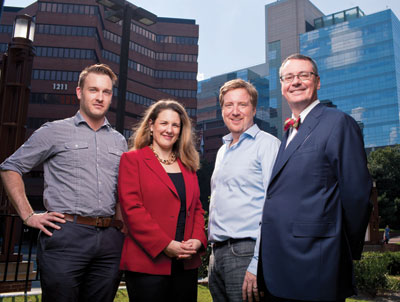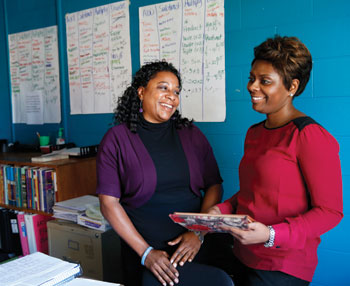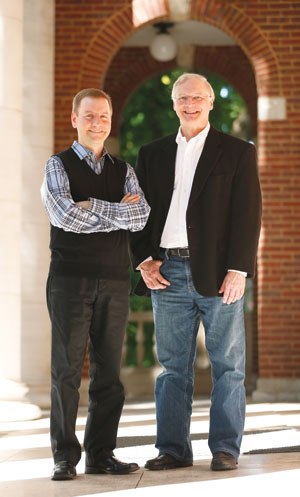 Continued accolades might go to any institution’s collective head. Yet Peabody College’s place atop the rankings of education schools nationwide has made the school’s faculty and leadership anything but complacent. The forward-looking approach that helped to build the college continues to infuse its institutional culture: At Peabody, innovation has become standard operating procedure.
Continued accolades might go to any institution’s collective head. Yet Peabody College’s place atop the rankings of education schools nationwide has made the school’s faculty and leadership anything but complacent. The forward-looking approach that helped to build the college continues to infuse its institutional culture: At Peabody, innovation has become standard operating procedure.
This can be seen in Peabody’s ongoing program development. In the last few years, the college has launched several new programs that cross disciplinary and organizational divides, both within Vanderbilt and out in the wider Nashville community. Here is a sampling.
Synergistic Research
This summer, Peabody College, in partnership with the Vanderbilt Brain Institute, formally announced the nation’s first doctoral program in educational neuroscience. The school now is accepting applications for fall semester 2013.
“Everyone involved in this has a sense that we’re pushing the envelope and creating something new that has a great deal of potential,” says Peabody Senior Associate Dean Craig Kennedy. Kennedy, a professor of special education at Peabody as well as an investigator with the Center on Integrative and Cognitive Neuroscience, Vanderbilt Brain Institute, and Vanderbilt Kennedy Center, is part of the team coordinating the program.
Educational neuroscience, still very much an emerging field, researches the complex interplay between learning and the brain’s chemistry, biology and activity. Its focuses include reading, math, language and psychosocial development.
“People are starting to look at the intersection of genes and neurobiology—how the brain is wired, before and after birth, through childhood, adolescence and into adulthood—and how this affects learning,” Kennedy says. “This can potentially contribute to a new generation of educational approaches.”

Kennedy says the idea for the program goes back about five years, to discussions among Dean Camilla Benbow, associate deans and department chairs about developing trends in education. Educational neuroscience, Kennedy says, is a perfect fit for a university with top programs in both educational research and neuroscience.
The school’s investment in this emerging field includes faculty recruitment. Peabody has hired three educationally focused neuroscientists within the last three years: Patricia and Rodes Hart Professor of Psychology Bruce McCandliss, Patricia and Rodes Hart Associate Professor of Special Education Laurie Cutting and Assistant Professor Gavin Price.
Cutting, who came to Peabody from the neurology faculty at Johns Hopkins School of Medicine, played a large role in designing the program’s curriculum, which combines a neuroscience core with courses that teach students to apply it to educational issues such as reading and math development.
“It’s a new field, so I wouldn’t say the boundaries have been fully designed,” Cutting says. “You take what you understand about the brain to help inform education, and the best approaches in education and vice versa. It’s a synergistic process.”
Cutting’s research focuses on the connections between brain activity and reading development and disabilities. As an example of the field’s potential, she describes what has been learned about brain activity and dyslexia.
“For years, the diagnosis of dyslexia was operationalized by assessing the discrepancy between IQ level and reading level (with a high discrepancy indicating reading weaknesses and therefore a need for intervention),” Cutting explains. “A number of years ago, we began to see converging behavioral evidence that this IQ achievement discrepancy method was not working. Now this has been shown neurobiologically, and that is a very powerful message. The brain activation patterns associated with reading are not different between those with the discrepancy and those without. The implication—the policy and identification implication—is that all these people who were poor readers weren’t getting help in schools because they didn’t have a big discrepancy. They were excluded from access to potentially life-changing services.”
Cutting adds, “Neuroprognosis, which means using neurobiology to predict responsiveness to intervention, is another area where educational neuroscience has great potential.”
Kennedy’s work includes research on the connections among autism; sleep deprivation, which is associated with altered serotonin levels; and behavior.
“We discovered people with autism were showing many sleep problems, and that this was affecting their behavior, but we really didn’t understand why. So we used animal models to study the effects of sleep deprivation and assess what’s affected in the brain,” Kennedy explains. This research is ongoing; its findings will have the potential to inform assessment and intervention strategies at the clinical level for students with autism.
Kennedy notes that educational interventions go beyond specific interventions in reading and math to
include social development and adjustment.
“A big component is psychosocial development, and how the brain changes,” Kennedy says. “For example, there’s been research on what happens in the brain when a teenager is rejected. It is similar to pain perception.”
Kennedy is excited about Vanderbilt’s leadership role in this developing field of study.
“Five years ago, there were few, if any, positions in educational neuroscience nationally,” Kennedy says. “Harvard and Johns Hopkins have master’s degree programs in educational neuroscience, but they’re often based on a small number of faculty. We’re really turning out a solid research foundation, along with new researchers to populate this emerging field. We’re hoping Vanderbilt will become the go-to place for the first generation of educational neuroscience researchers.”
Out in the Community
When Metropolitan Nashville Public Schools (MNPS) Director Jesse Register wanted to create a new master’s program that would attract the best and the brightest teachers to Nashville’s harder-to-staff middle schools, he didn’t hesitate to reach out to Peabody College.
“A goal of the program is to recruit very high-quality teachers, and to create longevity and stability, a situation where they stay for a while,” Register says, describing the Teaching and Learning in Urban Schools (TLUS) program. TLUS welcomed its first students in 2010, less than a year after Register brought the idea to Peabody Dean Camilla Benbow. This fall, it placed teachers in five MNPS schools.
The program requires students to teach in Nashville’s public schools for five years. During the first two, they also take two courses per semester toward their degrees: a course in a content area along with a seminar in urban issues. MNPS places the students according to district needs in groups of at least three per school so that they have a built-in support system. Peabody faculty visit their classrooms once a week to mentor and coach. In return for the participants’ five-year commitment, Peabody discounts their tuition, and MNPS covers the difference.
“I learned about this program at a middle schools conference,” says Clay Welch, who joined the program’s third cohort this July. This is his first year as a full-time teacher; he teaches language arts at Neely’s Bend Middle School. “I’ve always had a heart for the kids who are being left behind, the at-risk kids. I always thought I would go to a low-performing school. But I was nervous doing that my first year.

“A lot of teachers jump in wanting to save the world, but don’t have support and get burned out,” Welch says. “The idea of having a professor come to my class, of being able to ask questions, of having a cohort and having that support, those things brought me here.”
TLUS Director and Assistant Professor of the Practice Lanette Waddell also was impressed when Peabody recruited her in 2010 with the program’s well-designed combination of practical experience, professional mentoring and classroom instruction.
“The coaching aspect is incredibly important,” Waddell says. “Having an experienced person in your room every week to reflect with, and then connecting that with the classes you take, is really valuable.”
Waddell says her close involvement with her students helps her, too.
“I’m always in the schools,” Waddell says. “I get to see teachers teach, and then go back and think about what I saw. It really pushes my thinking and research. It’s a great mix of practice and theory.”
So far, MNPS has funded its financial support for the program with federal Race to the Top money. As that runs out, the district must find money elsewhere. It is now working with Waddell to evaluate the program’s teacher longevity and student outcomes. Register says that, though the metrics aren’t in yet, he has been impressed with the quality of teachers and their commitment.
“We want our teachers to become leaders within their schools, to learn how to work with students as opposed to imposing learning on them.”
—Lanette Waddell
“A lot of times, people coming into the teaching profession are not from settings where you have high percentages of urban diversity and poverty,” Register says. “You have to learn the cultures of the children you’re working with, and you need to want to be there. I think formal education—the content knowledge—is very important, and that has to be emphasized, but teachers also have to learn to live and work in a culture that is perhaps different than the one in which they grew up.”
Register thinks a master’s program gives teachers the opportunity to gain critical skills, knowledge and experience.
“You can’t learn everything that it takes to be a successful urban teacher in four years,” Register says. “The social and emotional component of teaching adolescents is really important. It takes a long time to get those skills.”
Welch couldn’t agree more. He already sees how what he studies in his urban issues seminars will apply to his classrooms.
“It’s extremely challenging,” Welch says. “The shock is the number of students whose parents want us to teach them all the life skills as well. It goes way beyond teaching them content. It’s about teaching them how to be an adult, or I guess a teen.”
Waddell says the program will help her teachers become the advocates that their students need. Part of that depends, she says, on understanding the community in which they live.
“We want our teachers to become leaders within their schools, to learn how to work with students as opposed to imposing learning on them,” Waddell explains.
Welch aims to be that advocate.
“I want to be able to teach any student who comes into my classroom from an urban setting, and do so in a way that makes the student comfortable and allows them to enter into learning,” Welch says. “Students in the same neighborhood can have very different circumstances. I want to help those who have the biggest deficits and those who have the least.”
In his first months, Welch already has learned simple yet effective ways to reach out to students, from greeting them at the door to keeping snacks on hand for peckish stomachs.
“Every day, when they come in, I stand at the door, shake their hands and welcome them,” Welch says. “One day I was late, and one kid shouted, ‘Mr. Welch! You’re not at the door! You’re not at the door!’ Consistency is so important.”
More Tools for Undergraduate Success

“Quantitative methods have always been a part of education and psychological research,” notes Peabody Professor of Psychology and Human Development David Lubinski. “They’re just becoming more relevant and needed for evaluating what’s going on in the world today.”
Peabody is responding to that need with a new undergraduate minor in quantitative methods. In addition to the two-course introductory statistics sequence already mandatory for all psychology majors, this minor will require four advanced courses. Choices include psychometrics, modeling, correlation and regression, and multivariate statistics.
“Students just don’t know about these methods and basically entire areas of study, yet quantitative methods are critical for scientific research.”
—Kristopher Preacher
“There were several factors behind creating this minor,” Lubinski says. “One, on a more global level, if you think of the problems facing our culture—socioeconomic problems, health care or even climate change and discovering oil-independent energy sources, you need quantitative reasoning, methods and tools to understand them, to understand the news and to be consumers of information. Simultaneously, if you look at the exceptional undergraduates coming to Vanderbilt, most are ready for a certain amount of graduate school coursework material during their undergraduate careers. They are ready for advanced courses.”
Kristopher Preacher, assistant professor of quantitative methods, concurs. He raised the idea for the minor when he came to Peabody in 2011 and was met with an enthusiastic response.
“Students just don’t know about these methods and basically entire areas of study,” he says. “Yet quantitative methods are critical for scientific research.”
The minor, first offered this fall, is open to the entire university.